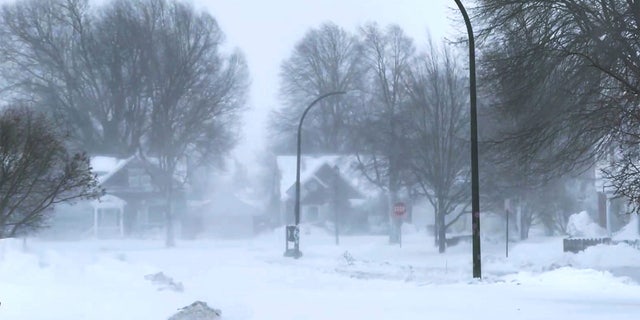Long Island county sends crew to help rescue efforts in Buffalo region
Nassau County, New York, crews arrived in Erie County on Monday, offering assistance in the form of personnel, snow removal equipment and more for the Winter Storm Elliott cleanup efforts.
“Thank you to @NassauExec Bruce Blakeman for sending up members of your @NassauOem & NassauPD team to assist Buffalo and Erie County in our time of need,” Erie County Executive Mark Poloncarz tweeted on Monday evening.
Along with his post, Poloncarz was seen posing with members of the Nassau crew in front of a pay loader in Erie County.
WESTERN NY DEATH TOLL CONTINUES TO CLIMB AS WINTER STORM RAGES ON
Blakeman sent 18 county employees, two large pay loaders, two pickup trucks, one large generator, one large air pump, four police cars and two Chevy Tahoes to Erie County on Monday, which lies in the western region of New York.
The Blizzard of 2022, as of Monday, has claimed the lives of 27 people in New York.
The deadly storm caused white-out conditions starting on Friday and into Sunday, with more expected to occur during the overnight hours between Monday and Tuesday.
WINTER STORM KILLS AT LEAST 12 IN NEW YORK, WITH MORE DEATHS EXPECTED TO BE ANNOUNCED
Along with white-out conditions, the storm created treacherous driving conditions and power outages for thousands of residents.
ABC station WABC in New York City reported that the team leaving from Nassau County was expected to be in Western New York until Friday, and if more help is needed, the county executive said he could send another crew.

The equipment sent to Erie County will likely be used to help crews mobilize through the snow.
BUFFALO, NEW YORK, WINTER STORM LEAVES THREE DEAD AS AREA BURIED IN 28 INCHES OF SNOW: ‘LIFE THREATENING’
Nassau County Emergency management Commissioner Richard Corbett said one vehicle that was sent is an 8-by-8 vehicle that can go on land and water.
The amphibious vehicle will mostly be used to transport and support humanitarian missions, rescuing people from their homes and transporting first responders to hard-to-reach areas.
Read the full article Here


